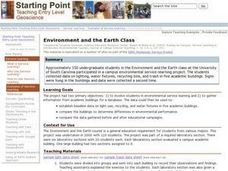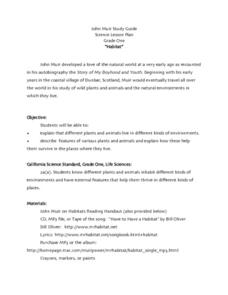Curated OER
United States & Canada: How Are We The Same? How Are We Different?
Pupils compare and contrast similarities and differences between Canada and the US. In this geography lesson, students read various articles and identify similarities and differences in economies, cultures, geography, climate, and...
Curated OER
The Risk-Benefit Factor Challenging Our Environment
Seventh graders examine the factors that are contributing to the degrading of the Earth's environment. In groups, they analyze the types of hazards when dealing with pests and give an example of each. For each situation given, they...
Curated OER
The Impact of the Physical Environment on Stream Macroinvertebrates
Students explore the relationship between leaf packs in streams and macroinvertebrate populations. They experiment with hand exposure to stream macroinvertebrates in natural leaf packs and then make leaf packs of their own. The...
Curated OER
Products, the Environment and Consumer Choices
Students review the factors of production and how they are used to make the products they buy. In groups, they participate in different scenerios in which they discover the amount of power they have to affect change buy purchasing the...
Curated OER
Adapting to Seasonal Changes in the Environment
Fourth graders discuss how plants and animals, including humans, adapt to climate and seasonal changes. They research the Colville people, and create dioramas that represent life during different seasons for Colville people.
Curated OER
Waste Minimization and Protecting the Environment
Students study the amount of waste produced and its effects on the environment. They discuss food, money, and energy and how their waste effects others. They read a play to explore how waste is produced and create a collage of...
Curated OER
The Power of the Environment in Our Lives
Young scholars participate in a series of activities designed to demonstrate the differences between symbiotic and parasitic relationships. They discuss the differences and catergorize man's relationship with nature.
Curated OER
Environment and the Earth
Students were involved in environmental service learning and they gathered information from academic buildings for a database. The data allowed them to use an establish baseline data on light use, recycling, and water fixtures in five...
Curated OER
The Environment and Pollution
In this pollution and the environment worksheet, students complete matching and fill-in-the-blank questions associated with pollution. Some though-provoking conversation starters are embedded in the plan to help the students discuss the...
Curated OER
"It's Okay to be Different"
Students discuss the concepts of same and different and then listen to a read aloud of "It's Okay to be Different," by Todd Parr. They compare the outside of brown and white eggs and then the insides. They discuss how this applies to peo
Curated OER
Applied Science - Built Environment Post Lab (Energy)
Learners study science. In this efficiency lesson, students explore different forms of energy and compare them to determine which works the best. They work independently to create a collage of different energy sources (using magazine...
Curated OER
A Tool for the Environment
In this desalting salt water activity, students will read about three different methods of desalting sea water which includes distilling, crystallizing, and filtering. Students will describe these methods in three short answer questions...
Curated OER
The Mountain Environment - Avalanche!
In this environment worksheet, students draw picture that illustrate an avalanche adventure. They draw a free snowfall on a mountain, the engine that is vibrating, the avalanche that traps men, and fill in speech bubbles that tell how...
Curated OER
Water in the Environment
In this water in the environment instructional activity, students match 10 terms related to water to their definitions. They identify 10 sentences as true or false related to groundwater, layering and landfills. They fill in the blanks...
Curated OER
Gold Rush Abolitionists: How different was the role of Spanish-speaking blacks under Mexican rule from the role of English-speaking blacks under U.S. rule?
Students determine how Spanish-speaking blacks and English speaking blacks were treated differently. For this emancipation lesson, students compare the Mexican and American rules regarding slavery.
EduGAINs
Go Eco! Ecosystems
How is a movie theater like a desert biome? Compare systems to ecosystems with a set of activities that focuses on accessing multiple intelligences and building upon knowledge. As learners discuss the ways elements of an ecosystem depend...
American Institute of Architects
Architecture: It's Elementary!—Fifth Grade
Young citizens construct an understanding of urban planning in this cross-curricular unit. Covering every aspect of city development from the political, economic, and social influences to sustainable building practices, this 10-lesson...
Kenan Fellows
Sustainability: Learning for a Lifetime – The Importance of Water
Water is essential for life—and understanding the importance of clean drinking water is essential in understanding sustainability! Show your environmental science class the basics of water testing and treatment through a week-long...
Purdue University
Design of an Earthen Dam for a Lafayette Neighborhood
How do dams support bodies of water? Scholars engage in a hands-on STEM activity where they design, build, and test dams to learn about bodies of water and how humans use natural resources. They learn how criteria and constraints affect...
Science 4 Inquiry
The Ups and Downs of Populations
Life has its ups and downs ... especially if you're an animal! Biology scholars engage in a population study through an inquiry-based instructional activity. Pupils work together to explore the factors that affect deer populations, then...
Curated OER
Investigating the Effect of Minerals on Plant Growth
How do different minerals affect the growth of plants? Budding botanists find out in a multi-week experiment that has them using solutions with specific mineral deficiencies. While there is a lot of preparation for the investigation,...
Nuffield Foundation
Monitoring Water Pollution with Invertebrate Indicator Species
Healthy invertebrates mean healthy ponds. An outdoor activity has scholars collect samples of invertebrates from local lakes or ponds. They identify and count different species and use the information to estimate the level of pollution...
Curated OER
"Habitat'
First graders explore and explain that different plants and animals live in different kinds of environments. They illustrate various plants and animals and how they survive in the places where they live. A nature journal for enrichment...
Curated OER
Life Cycle: Diversity in a Balance 4th Grade Workbook
In this life cycle workbook, 5th graders examine plant and animal cells, classification of organisms, human biology, photosynthesis, and natural environments. 21 different activities make up the Life Cycle Workbook.

























